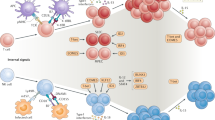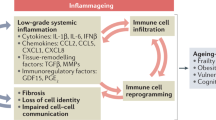Abstract
THE purpose of the work recorded here was to determine whether, in regard to a given antigen, there exists a qualitative difference between two populations of immunologically competent cells, quantitatively identical, deriving from two types of donors, which have been subjected previously to antigenic stimulation, quantitatively identical, by the same antigen, but at moments when their respective populations in immunologically competent cells were quantitatively different.
This is a preview of subscription content, access via your institution
Access options
Subscribe to this journal
Receive 51 print issues and online access
$199.00 per year
only $3.90 per issue
Buy this article
- Purchase on Springer Link
- Instant access to full article PDF
Prices may be subject to local taxes which are calculated during checkout
Similar content being viewed by others
References
Amiel, J.-L., Mathé, G., Matsukura, M., Mery, A., Daguet, G., Tenenbaum, R., Garattini, S., Brezin, C., and Palma, V., Immunology, 7, 711 (1964).
Howard, J. G., and Michie, D., Transpl. Bull., 29, 91 (1962).
Michie, D., and Woodruff, M. F. A., Proc. Roy. Soc., B, 156, 280 (1962).
Author information
Authors and Affiliations
Rights and permissions
About this article
Cite this article
MATHÉ, G., AMIEL, JL. Number of Immunologically Competent Cells and the Type of Immunological Reactions. Nature 206, 202–203 (1965). https://doi.org/10.1038/206202b0
Issue Date:
DOI: https://doi.org/10.1038/206202b0
Comments
By submitting a comment you agree to abide by our Terms and Community Guidelines. If you find something abusive or that does not comply with our terms or guidelines please flag it as inappropriate.



